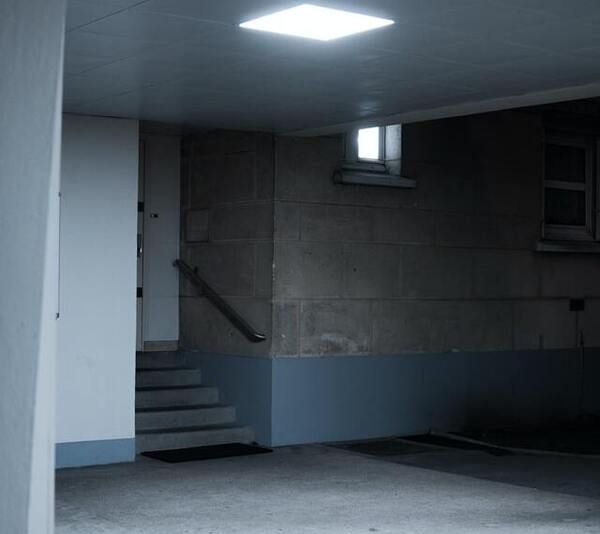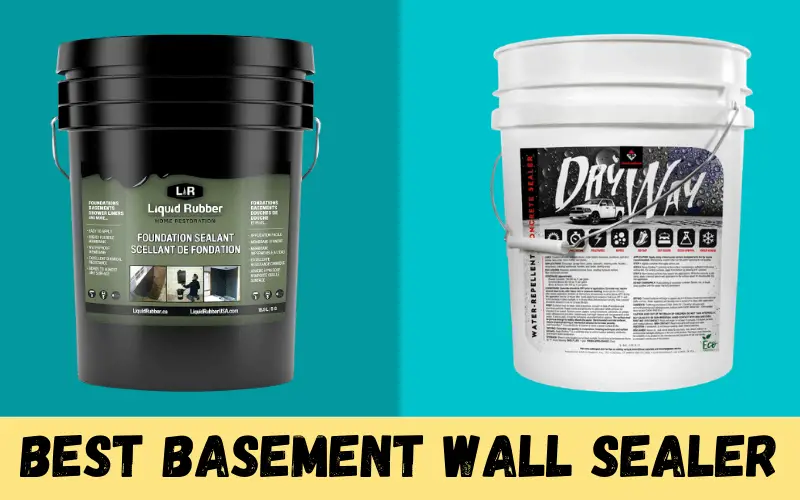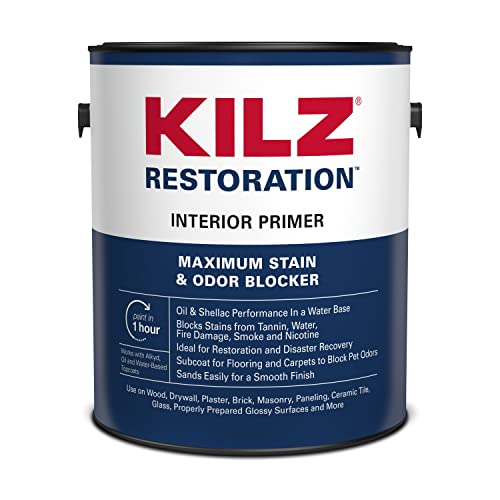The best basement wall sealer comes with so many features right out of the box that you brainstorm. It constantly heals the integral part of the weeping walls, every time after rain. The sooner you seal it, the better it will appear.
We know the musty basement wall aggravates periodically after enduring weathering effects and moisture accumulation. So, depending on how much your wall is vulnerable to mold, cracks, fungi, you need to choose between one to another.
We’ve researched and inspected the damage types of different basement walls, and now we will show you the right sealer in this review. We believe you will find the perfect bait of sealing agents, so let’s delve into it.
Another interesting read: Best Teak Sealer Review
A comparison table of the best basement wall sealers
What Is A Basement Wall Sealer?
Basement waterproofing sealer entails considerable chemical compounds that deter any harmful foreign materials to come and sit inside. It would be mold, fungi, water, and you cannot picture them all.
The sealer is porous to dig and sit inside the integral part of the surface. Besides, it often comes with an Alkaline agent that retains the pH level resulting in less moisture accumulation.
Basement sealers are not a typical one as they apply to many types of walls. For example, water-based sealers leave no color, but solvent-based sealers leave aesthetic color. However, more or less, every sealer prevents water seepage and foreign particles.
Best Basement Wall Sealer: The Ultimate Review
1. Best Overall: Liquid Rubber Foundation and Basement Sealant
- PROTECTIVE FINISH FOR - Foundations, ICF's, Basements, Shower Liners, Deck and Fence Posts, Planter Boxes, Metal, Wood, Concrete and more
Liquid Rubber Sealant comes with endless possibilities and is effective both for the interior and exterior texture. We choose this item as the best pick because we found – it has the maximum elongation ability to seal the membrane of your basement wall.
Coming up to the different features, we find it as the eco-friendly water-based solvent having no fumes, flame, odor, or VOCs. Once you put it off the surface, then it will hang down loosely or unevenly, which seems it is pretty flexible to many surfaces alongside the basement wall.
Moreover, it is not just a sealer; besides, it is widely used as sticky foundation glue, which firmly adheres to the deck, fence, metal surface, concrete, and many more.
However, the frailty with the sealer is to seal the surface with pavement or roads. If you want to seal your interior part and a little bit of the outside driveway, then SX5000 WB DOT will fix your issue.
After the versatile application on many surfaces, it cut the cost of bringing a plumber to fix the shower liners or your deck. Since it is a wet-based substance with a rubberized texture, the solution easily dries up on the vertical basement wall, which is a major ace of any sealer.
One of the rudimentary compounds of liquid rubber sealer is the Geo-Textile fabric. The finest innovation with the anti-seepage performance will separate your wall from any type of liquid, dust, moisture, and reinforce the synthetic polymer to sustain the elongation. Here is why this product is the most durable pick and has great value for the money.
Pros
- Eco-friendly waterproofing product & safe for pet/human
- Easy to apply without mixing additives
- 900% enhanced elongation avoid water seeping or dusting
- Apply on the indoor or outdoor surface & deters protrusion
Cons
- The sealant solution seems gooey and sticky, so it needs much care and effort while cleaning up the mess after applying.
2. Best Sealant: Drylok 275 Masonry Waterproofer
- GUARANTEED to stop water - withstands 10 pounds of hydrostatic pressure (PSI), equivalent to a wall of water 22 feet high
Drylok white extreme waterproofer is for indoor or outdoor masonry work. The key feature of it is to have the latex formulation making it an Epoxy semi-gloss floor painting application.
It is a sealer greatly infused with hydrostatic pressure for the elevated walls up to 22 feet high. Therefore, Drylock will easily find its way against gravity and kicks off the soil/dust/mites across the basement.
Furthermore, when you opt for a penetrable sealer with a glossy finish, then you find Drylock the best-rated basement wall sealer. A cheaply made sealer does the same job for basement walls. But they often impact badly with radon gas or other contaminants. Here Drylock preferably reduces such vapor transference. So here is why it makes the product a bit expensive. But certainly, it will be a good value for your money when the budget is not a barrier to have the best basement wall sealer.
Waterproofing basement walls from outside is susceptible to many things to clean up or wipe out before applying a sealer. Yes, most sealers may not do the trick to let it off and apply without cleaning up the mess.
The drydock, with its hydrostatic pressure, does the job for many outdoor walls surfaces like concrete, cinder block, bricks. For the interior, it leaves the paint beautifully and does the sealing work effectively. The one sealant does many jobs indeed.
Pros
- Easy to apply without pre-wetting or mixing
- Ability to cast glossy finish with 50% tinting ingredients
- Best applicable for flooding area & wind-driven rain
- Ultimate for waterproofing and resisting mildew growth
- 10-years of Warranty
Cons
- When you cannot cool-down the interior below 40F, it is not the right bait.
3. Best For Cracks: Flex Seal Liquid Rubber in a Can
- Flex Seal Liquid is liquid rubber in a can! Now you can brush, roll, dip or pour it on!
The best basement wall crack sealer we find is a flex seal that is infused with the rubberized liquid entity. As a result, it entails cracks repair pretty fast without leaving nooks & crannies.
Keep in mind that the interior surface of basement walls requires rugging at first using sandpaper unless the surface would be slippery when wet. Similarly, for the old exterior surface, you need to remove the debris and apply it with or without a stiff bristle brush.
The proven standpoint of it is to have the flexibility and allow painting for an exterior or interior wall basement. The flexibility issue has been tested with the Flex seal sprayer and found effective by consumer reports.
Flex seal has an endless application on many surfaces, no matter it is metal or nonmetal, tiles, or concrete, or bricks whatsoever. The finish of the grey color suits all of them.
If you have a window or door near the basement walls, the hairline cracks seem somewhat unavoidable because every time you slam the door or window, a little contraction slowly hits the surface. Thanks to the Flex seal, which consistently repairs the issue.
Pros
- Non-drip adhesive chemical resistant to water/oil/UV-rays and gas
- Waterproof seal easily seeps into the cracks
- For outdoor basement wall, prevent rust and corrosion
- Cost-effective as opposed to the replacement costs
Cons
- It is not odorless, so when sealing interior basement walls, make sure to have proper ventilation unless you will feel sick.
4. Best Odor-Blocker: KILZ Restoration Maximum Stain and Odor Blocking Interior Latex Primer/Sealer
- KILZ Restoration (formerly KILZ MAX) is a water-base primer, sealer and stain blocker developed with new technology that is formulated to perform...
Water seeping and moisture controlling would be the major but not the only issues to take care of. Our interior wall is often susceptible to many types of stains. To resolve such complications, we recommend you with the KILZ Restoration for preventing the maximum stain and odor.
If you have kids playing with ink or pencil, the stains leftover the surface. Besides, the oil grease tends to leave a stubborn mark, and a regular sealer does not fix it even if it comes with flexible paint. Consequently, the mark will even appear on it, resulting in a bad investment. Killz will fix it as it comes with oil- or shellac-base primer leaving the white paint.
Serving your unique basement wall with woodwork, glass, or metal is somewhat impossible to apply on traditional sealers. Kilz is the right choice as it completely seals not only water but also different types of unique stains.
Applying the most effective basement wall sealant is somewhat expensive when it arrives with a wide array of features. The tricky part is to save your bucks by applying a sealer with primary features like blocking stain or rust. If you are thinking so, then Kilz, here is the Best basement block wall sealer for you.
Pros
- Once applied, the white paint remains and deters stains
- Easily tackle the heavy water stains
- Ultimate odor blocker from pet residue
- Seal the previous marks from Art using marker, ink, or pen
Cons
- Not applicable for active leaks or any crack filling work.
5. Best Budget: Lithi-Tek 9500 Ultra Concentrate Penetrating Concrete Sealer
- An industrial-grade, water-based, proprietary sealer designed to densify, strengthen and waterproof concrete: increasing abrasion resistance...
You must be looking for a sealer that is applicable to waterproofing basement walls from the outside. No worries, Lithi-Tek 9500 would be the best concrete basement wall sealer designed for maximum penetration and densification.
5 gallons of sealer will cover the thousands of sq. ft of concrete; that being said, it is considered as the best budget-oriented sealer with efflorescence. Moisture is the worst enemy to reduce the expected lifespan of concrete walls.
With the Alkaline agent, this sealer turns out as a shield to any moisture intrusion. Your outside walls will be exposed to the cold session, making the surface vulnerable to developing mold and meadows. We found it pretty effective, varying from 40 F – 95 F temperature.
We won’t recommend the expensive pick that comes with hydrostatic pressure. Instead of that, save your bucks, because this sealer is made for concrete walls, no matter how much water flows down to the surface linked with the drains or pipes.
For concrete basement walls, a sealer only serves its purpose with abrasion resistance. Surprisingly, it strengthens the concrete surface by up to 50% without much spending. Without further ado or much care, the hardener compounds mitigate erosion remarkably.
Pros
- Deters the maximum moisture intrusion from any harsh weather
- Ease of sealing application across the vertical walls
- Perform maximum penetration under minimum bucks
- An odorless Alkaline agent with low VOCs
Cons
- Not a perfect deal for your interior basement walls
What To Consider Before Buying The Best Basement Wall Sealer
The surface of your basement wall requires inspecting at first. Different sealers turn out great in regards to the different surfaces and the different weathering effects.
For example, the cinder block wall requires more penetration and is more vulnerable to dusting agents. The most common surface is the concrete, which is largely affected by water seepage resulting in moisture and mold buildup.
Here, you will need to consider a sealer for waterproofing concrete block walls inside that comes with deep penetration ability and seal the surface for good. For the exterior part, it does the same, but the further ado is to have a densifier that will solidify the wall aggravatedly.
One of the major concerns that we often overlook is the thickness of a sealer. The basement wall is a vertical surface, and the sealer requires it to be that much thick enough to penetrate it. Here the sealer for driveway or road and solvent-based sealer for floors won’t match the job.
From the standpoint of filling the cracks, always look for the best sealer for basement wall cracks. We recommend a sealer that comes with adhesive chemical compounds with a fast dry-up application after the second coating.
Aside from the variants, all types of sealers should be safe and eco-friendly. If it is for the interior, then opt for a sealer that comes with odorless, inflammable, low VOC features.
The sealer also comes with two versions, either painted or unpainted or colorless. The painted version is commonly used for interior basement walls, leaving a semi or high gloss finish. The transparent sealer without color has more ability to trap the moisture, so if the basement walls require so, then choose it without any second thought.
Last but not least, some sealer comes with offering different types of applications to seal the basement walls. The rest of the sealers only offer one or two, and these are rolling, brushing, and spraying methods. The vertical sealer is easy to roll and spray without much effort, so keep in mind as well.
How To Waterproof Your Basement Wall Using A Sealer?
Waterproofing your basement walls using a sealant is the right trade-off. But before applying, you need to run the test to see the damage. So, when your exterior basement is largely exposed to high temperature or when humidity comes across the interior surface, the water-based sealer with an Alkaline agent will cure moisture intrusion mostly.
On the other hand, mold and fungus may outbreak, and it is common for the concrete slab. The reason for having such issues is from moisture as well as the second-degree order. You can waterproof the basement walls when your sealer deeply penetrates inside the concrete slab and barrier to such mold/fungus build up.
What Are The Benefits Of Sealing Basement Walls?
- It helps to get rid of water seepage. The sealer itself penetrates the wall but creates a stronghold not to give access to water.
- A sealer always limits the growth of mold and mildew.
- Save electricity bill.
- It restricts foreign objects, as mentioned above.
- Bring glossy finishes.
- Prolongs the surface not to have any minor cracks up to a certain period.
What Should You Keep In Mind While Sealing The Basement Wall?
- The first is don’t leave the debris on the surface before applying a sealer. You can rug the surface also using sandpaper for the exterior basement walls.
- Do not forget to fill the cracks in the basement. The hydraulic cement would be great to perform, so pour it first using putty knives, then apply the sealer.
- Don’t forget to inspect the minor hairline cracks, especially beside the window or door, unless the best sealer becomes forgiving and won’t last. Make sure the water won’t remain underway the cracks, and you seal it.

Frequently Asked Questions (FAQs)
What is the best product for sealing basement walls?
Liquid Rubber Sealant comes with a wide array of features and is effective both for the outdoor and indoor basement walls. We recommend this product as the best pick from the buck, due to the maximum elongation ability to seal the layer of your basement wall.
Can you seal a basement from the inside?
You need to seal the inside walls by applying the perfect waterproofing product. Keep the ventilation with enough air and light to dry up the first coating. The second coat will fill all the porous gaps and prevent water seepage or moisture intrusion. In this way, you can seal a basement from the inside.
Is drylock good for basement walls?
Drylock is good when the moisture intrusion causes no harm. Because the breathable film or texture won’t allow it to trap moisture. On the upside, it works against gravity and seals the elevated walls using hydrostatic pressure, and leaves a beautiful gloss finish.
Should I seal my basement walls?
If water, moisture, and harmful foreign objects like mold get in their way, then you should seal your basement walls with or without paint. Moreover, you should also seal the basement walls when it is susceptible to the cracks and stains.
How do you waterproof a basement from the outside?
Waterproofing a basement from the outside using a sealant is a cost-effective approach. Excluding this, you need to excavate the basement, install the drainage pipes, apply the foundation to watertight the membrane, and finally seal it.
Do basement sealers work?
Basement sealers work in different conditions with or without painting. Since every basement sealer activates the surface with an emulsifying agent that deters the water seepage, moisture, and mold growth, so it works.
Why does exterior waterproofing not last?
Exterior waterproofing may not last when you did not clean or wipe the debris before coating. For new construction, not applying the sanding across the surface is another issue.
Conclusion
A basement wall sealer has many things to do right out of the box, which we have mentioned at the top. It is a tough place though it is vertical and somewhat uneven for applying to seal.
If you scoop up any sealant without paying much heed, it turns out a bad investment for you. We inspected different circumstances with having one feature too many features, and one type of basement wall too many types.
Finally, we have sorted out a couple of the best basement wall sealers based on certain conditions. Now, it is your turn to opt for what product for what condition.
Another must-read: Best Butcher Block Sealer Reviews







